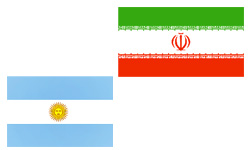TEHRAN (FNA)- Argentina’s Charge D’affaires in Tehran Mario Enrique Quinteros blasted the western media for using the testimonies given by the anti-Iran terrorist Mojahedin-e Khalq Organization (MKO) to the case of a 1994 bombing of a Jewish cultural center in Buenos Aires.

Western and Israeli media reports claimed that a number of Iranian officials are wanted by Interpol in connection with the AMIA case, which left 85 dead and wounded more than 300 others.
Iran has strongly denied the allegations, saying Alberto Nisman, the prosecutor of the case, has received huge sums of money from Jewish lobby groups in Argentina to accuse Tehran of the bombing.
"It is a question to me why a large number of international media have based their reports on the remarks and testimonies of a number of the members of this group, and why certain countries have used these testimonies to ruin Iran’s face," Quinteros said in a meeting with Hasheminejad, Secretary General of Habilian Association.
Habilian is an association formed of the families of martyrs of terror attacks.
During the meeting, Hasheminejad termed the documents presented by the MKO members in the AMIA case "fake", and said, "Whenever the MKO feels there is tension between Iran and other countries, it misuses the opportunity and does its best to impair the relations between Tehran and that given country."
He further presented a number of documents on MKO’s involvement in terrorist attacks in Iran which were well received by the Argentinean diplomat.
The MKO has been blacklisted as a terrorist organization by many international entities and countries.
The MKO is behind a slew of assassinations and bombings inside Iran, a number of EU parliamentarians said in a recent letter in which they slammed a British court decision to remove the MKO from the British terror list. The EU officials also added that the group has no public support within Iran because of their role in helping Saddam Hussein in the Iraqi imposed war on Iran (1980-1988).
The group started assassination of the citizens and officials after the revolution in a bid to take control of the newly established Islamic Republic. It killed several of Iran’s new leaders in the early years after the revolution, including the then President, Mohammad Ali Rajayee, Prime Minister, Mohammad Javad Bahonar and the Judiciary Chief, Mohammad Hossein Beheshti who were killed in bomb attacks by MKO members in 1981.
The group fled to Iraq in 1986, where it was protected by Saddam Hussein and where it helped the Iraqi dictator suppress Shiite and Kurd uprisings in the country.
The terrorist group joined Saddam’s army during the Iraqi imposed war on Iran (1980-1988) and helped Saddam and killed thousands of Iranian civilians and soldiers during the US-backed Iraqi imposed war on Iran.
The MKO was put on the US terror list in 1997 by the then President, Bill Clinton, but since the 2003 US invasion of Iraq, the group has been strongly backed by the Washington Neocons.

